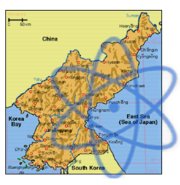North Korea claims it has conducted a nuclear test
Monday, October 9, 2006
According to South Korea-based Yonhap News service, and the Associated Press, North Korea has announced that it has successfully conducted its first nuclear test.

North Korea first announced it possessed nuclear weapons in 2005, though because it had not conducted a nuclear test its nuclear capability remained ambiguous. The United States, Japan, China, and South Korea have all urged North Korea to abandon its nuclear program. North Korea released a statement on October 3 saying that it would soon conduct a nuclear test, and also emphasized that it would neither use nuclear weapons first nor aid other countries in nuclear proliferation. The state claimed that it would only use the weapons as a deterrent against the United States and its allies. In 2003, U.S. President George W. Bush and South Korean President Roh Moo-hyun said that they "would not tolerate" a nuclear North Korea. China and Japan have also expressed concern.
U.S. officials have reported that the government of the People's Republic of China was given a 20-minute advance warning that the test was about to occur. The PRC sent an emergency alert to Washington through the United States embassy in Beijing and President George W. Bush was told shortly after 10 p.m. that a test was imminent by National Security Advisor Stephen Hadley.
Rumors of an impending nuclear test have circulated since North Korea announced its weapons capability. The Natural Resources Defense Council estimates that North Korea may have up to 10 or 12 nuclear devices already built.
According to North Korea's Central News Agency, the country conducted an underground nuclear test successfully without any radioactive leakage. Underground tests, if they fully contain the nuclear blast, can result in a minimum of nuclear fallout contamination. If confirmed, the nuclear test by North Korea would be the first nuclear test since the dual Indian and Pakistani nuclear tests of 1998.
The U.S. Geological Service has recorded a magnitude 4.2 event in eastern North Korea at 01:35:27 (UTC), or 10:35:27 North Korean local time.
U.S. President George W Bush speaking at the White House ahead of an emergency closed session of the UN Security Council called the action "unacceptable ... North Korea has defied the will of the international community and the international community will respond." He also described it as "a threat to international peace and security. The United States condemns this provocative act."
Bush contacted the leaders of Russia, China, Japan and South Korea, the other nations that have been engaged in negotiations with North Korea. All have already denounced the action. China using the harshest language yet against its old war time ally, calling the test "brazen". Japan's Prime Minister Shinzo Abe insisted on "decisive action."
Some experts are speculating that the test may push the United Nations to back sanctions against the North Koreans, Japan's U.N Ambassador Kenzo Oshima has told reporters in New York that the United States is drafting the resolutions, which could range from trade restrictions to monetary dealings and even a sea based blockade. The sitting members have strongly condemned the nuclear test.
In the first significant reaction to the announcement the South Korean government has decided to suspend a scheduled shipment of its emergency relief aid to its northern neighbor. An official from the Unification Ministry said "A ship was scheduled to depart ... carrying 4,000 tons of concrete on Tuesday, but we decided to delay the shipment under the current circumstances."
The yield of the device has not been conclusively confirmed. Fox News has reported the yield at below 4 kilotons, citing a unspecified senior Bush administration official; however, Russian military sources estimate the yield as between 5-15 kilotons. The Korea Institute of Geoscience and Mineral Resources stated its estimate of the yield as 550 tons, but later scaled it up to 800 tons.
A senior seismologist at the Australian Seismology Research Centre said that a 4.2 magnitude quake would roughly correspond with a one kiloton explosion, but would not say it was conclusive, since it depends on the type of rock that the test was set off in.
It has been reported that the Korea Exchange, South Korea's main stock exchange, suspended trading for five minutes upon hearing news of the test.
Sources
- "N. Korea announces it succeeded in nuclear test" — Yonhap News, October 9, 2006
- "Report: NK may have performed nuclear test" — CNN, October 8, 2006
- "North Korea confirms nuclear test" — CNN, October 8, 2006
- "North Korea claims nuclear test" — BBC News Online, October 9, 2006
- "Magnitude 4.2 - NORTH KOREA" — U.S. Geological Survey, October 9, 2006
- "Shipment Delayed" — Yonhap News, October 9, 2006
- "Bush Speaks" — Bloomberg, October 9, 2006
- "UN Council condemns N Korea's nuclear test" — Reuters, October 9, 2006
- "N.Korea nuke test relatively small-scientists" — Reuters.com, October 9, 2006



